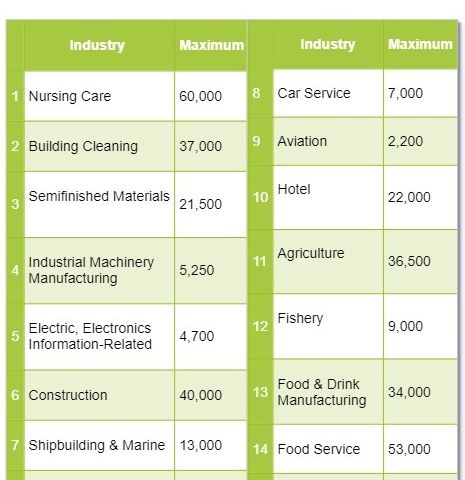[UPDATE on April 2024]

[UPDATE on June 2023]
On June 9, 2023, the Cabinet decided to change the policy on the operation of the system related to the Specified Skilled Worker visa.
Specified Skilled Worker (ii) with no Visa expiration date to expand in the following designated job categories:
Building cleaning, Machine parts & tooling industries, Industrial machinery industry, Electric, electronics & information industries, Automobile repair & maintenance, Aviation, Accommodation, Agriculture, Fishery & aquaculture, Food & beverages manufacture, Food services in addition to current Construction, and Shipbuilding & machinery.
.png)
Source: Japan’s Ministry of Foreign Affairs
12-Field Specified Skilled Workers (SSW) Visas
Japan is looking for Specified Skilled Workers! | Ministry of Foreign Affairs of Japan (mofa.go.jp)
Registered Support Organization (RSO)
Entities, including companies and organizations, accepting Specified Skilled Foreign Nationals must provide the necessary support, with the option to delegate the support plan partially or wholly to a Registered Support Organization (RSO). If RSO takes on full implementation, the entity complies with support system standards. However, RSO cannot re-delegate these support tasks.
The necessary support encompasses:
- Pre-arrival Guidance After concluding an employment contract, and before applying for a Certificate of Eligibility or before applying for a change of residence status, explain labor conditions, activities, entry procedures, and whether a security deposit is collected, either in person or via video call.
- Transportation Upon Entry and Exit Provide transportation from the airport to the workplace or residence upon entry and accompany you to the airport security checkpoint upon returning home.
- Housing and Essential Contract Support Act as a guarantor or provide company housing, guide the opening of bank accounts, mobile phone, and utility contracts, and assist with various procedures.
- Life Orientation Explain Japanese rules and manners, how to use public institutions and contact information, and disaster response to facilitate smooth social living.
- Accompaniment for Official Procedures Accompany for procedures related to residence, social security, taxes, etc., as needed, and assist with document preparation.
- Opportunities for Learning Japanese Provide information on enrolling in Japanese language classes and Japanese learning materials.
- Consultation and Complaint Handling Respond in a language that foreigners can fully understand for workplace and life consultations and complaints, and provide necessary advice and guidance according to the content.
- Promotion of Interaction with Japanese Residents Facilitate interaction with residents through neighborhood associations, and guide and assist participation in local festivals and events.
- Job Change Support (In Case of Personnel Reduction) Assist in finding new employment if the employment contract is terminated due to the accepting side’s circumstances, create letters of recommendation, and provide paid leave for job-hunting activities and information on necessary administrative procedures.
- Regular Interviews and Reporting to Administrative Agencies The support person in charge regularly interviews (at least once every three months) the foreign national and their supervisor, and reports any violations of the Labor Standards Law.
Foreign Support Center is registered by the Director-General of Japan’s Immigration Services Agency as an “Official Registered Support Organization”. (Registration No: 19登-000547)


.png)
登録支援機関.png)


